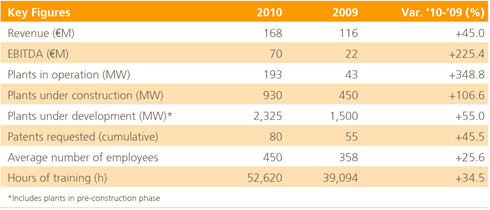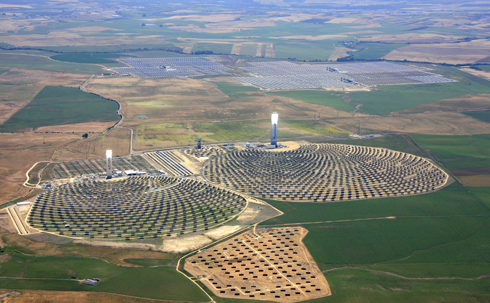 Abengoa
Abengoa
Annual Report 2010
- Activities
- Business Units Activities
- Solar
- Our Business
Our Business

Despite the economic backdrop, 2010 signaled the consolidation of the worldwide solar electricity generation market, as evidenced by the number of projects awarded in existing markets and the advent of new opportunities in emerging markets.
The changes underway in the energy sector in general have caused an increase in the competition among various renewable energy sources increasing the pressure among the various kinds of renewable technology. In this regard, solar power remains highly competitive due to value-added factors such as dispatchability, scalability and the existence of multiple technological options that strengthen its strategic position.
Despite the prevailing financial uncertainty and the constraints on debt markets, the sector’s development was bolstered by governmental support, including the confirmation in December of the current regulatory framework in Spain, the establishment of the Federal Loan Guarantee (FLG) program in the US, and the publication of stable and attractive regulatory frameworks in new markets. Following are some highlights:
- In Spain, construction commenced on close to 850 MW of solar thermal capacity, including 400 MW by Abengoa Solar. While a total of 350 MW entered into operation, all of which are included in the pre-allocation registry. Of this capacity that entered into operation, 150 MW are attributed to Abengoa Solar’s three parabolic trough plants in Sanlúcar la Mayor, Spain (Solnova 1, Solnova 3 and Solnova 4).
- The United States government earmarked close to $3,785 M of the FLG program for solar projects, of which $1,450 M was guaranteed to Abengoa Solar for the Solana project in Arizona.
- Internationally, new opportunities have arisen in North African and Middle Eastern markets, including Morocco and the United Arab Emirates.
Accordingly, Abengoa Solar has strengthened its strategic position in the industry and, at the close of 2010, held a total of 3,448 MW on portfolio, including: 193 MW in operation utilizing both power tower and parabolic trough technologies, 930 MW under construction, and 2,325 MW in development and pre-construction.

Abengoa Solar develops and implements solar power technologies in order to combat climate change and ensure sustainability through the use of concentrating solar power (CSP) and photovoltaic (PV) technologies, contributing to the development of the communities where it operates.
Due to its constant efforts in research and development (R&D), Abengoa Solar has proprietary technology which places it at the forefront of solar technologies in its ability to generate clean and efficient power at a competitive cost.
 Aerial view of the Solúcar complex in Seville, June 2010
Aerial view of the Solúcar complex in Seville, June 2010
Abengoa Solar is firmly convinced that solar energy meets the requirements to satisfy a significant part of society’s demand for clean and efficient energy sources, since every year the sun irradiates an amount of energy that amply surpasses the energy needs of our planet, and there are proven commercial technologies available today with the capability of harnessing this energy in an efficient way.
Abengoa Solar is also convinced that the renewable energies market, and more specifically the solar energy market, will continue to develop at a high rate, due primarily to:
- The greater political will and social awareness resulting from the mounting concern for climate change;
- The higher costs and volatility associated with fossil fuel markets, driven by the recent increase in demand for energy in developing countries
- The need to reduce energy dependence in countries with limited fossil fuel resources.
This is why Abengoa Solar aspires to develop and implement efficient and dispatchable technologies to produce solar energy in those areas with the greatest solar potential.
Abengoa Solar’s business model is based on three lines of activity:
- Development of CSP and PV plants
- Sale of energy from, and operation and maintenance of, those plants
- Development of new technologies through R&D, and the manufacture and sale of key components
Abengoa Solar is firmly convinced that solar energy meets the requirements to satisfy a significant part of society’s demand for clean and efficient energy sources, since every year the sun irradiates an amount of energy that amply surpasses the energy needs of our planet, and there are proven commercial technologies available today with the capability of harnessing this energy in an efficient way.
Abengoa Solar operates in three key geographical areas or markets:
- Spain
Abengoa Solar is posting strong growth in Spain thanks to the 13 projects listed in the pre-allocation registry, which will benefit from the financial framework established under Royal Decree 661/2007. - United States
Abengoa Solar commenced its activities in the US in 2006, and has one major project in Arizona that has started construction activities, and one in California that is under development. - Internationally
On the international stage, Abengoa Solar is building a CSP plant in Abu Dhabi, and is participating in the construction of an Integrated Solar Combined-Cycle (ISCC) power plant in Algeria. Abengoa Solar is also particularly active in North Africa, the Middle East, India, China, and Australia, and activities are expected to continue to grow in these countries and in new markets.
The geographic diversification of Abengoa Solar’s business affords major competitive advantages, such as less reliance on a specific regulatory framework, and helps to achieve greater business stability by reducing exposure to a specific market and its economic context.
Abengoa Solar conducts its business in a major growth market worldwide, with considerable opportunity for further growth due to the global need for energy solutions that combat climate change, that reduce countries’ energy dependency, and that avoid the higher cost and price volatility of fossil fuels.
As mentioned above, one of Abengoa Solar’s strategic pillars is its drive to develop proprietary new technologies through a constant effort in R&D that can be implemented in its sector, helping it to stay ahead of the field. This effort enables Abengoa Solar to secure economic advantages in a sector where technology evolves very rapidly, allowing it to offer competitive technologies going forward and a portfolio of solutions tailored to individual projects or markets.
Moreover, since its launch, Abengoa Solar has positioned itself throughout the value chain of the solar thermal energy business. This vertical integration enables Abengoa Solar to achieve synergies between the activities of development, operation and technology, such as designing optimal solutions, controlling key components and their supply, and enhancing cost competitiveness.
Lastly, Abengoa Solar’s experience in global markets has enabled it to become knowledgeable about a wide variety of regulatory frameworks. This know-how has been pivotal to its expansion in new markets with potential in CSP or PV energy, enabling Abengoa Solar to adapt more quickly than its competitors.
The team at Abengoa Solar has grown exponentially since the company was first launched, due mainly to the growth in activities and the consolidation and growth of the company’s project portfolio in several countries. During 2010, Abengoa Solar sought to attract top professionals and further develop their skills. In this regard, Abengoa Solar has implemented an integrated and comprehensive management system capable of meeting the needs of the company and its employees:
 View of PS10 and PS20 operating alongside Eureka, the high-temperature solar power tower pilot plant
View of PS10 and PS20 operating alongside Eureka, the high-temperature solar power tower pilot plant
- Integrated, in that it covers all human resource processes: identification, description and classification of jobs; selection process to attract the best professionals in the market; training and development, including career plans, assessments, performance management and remuneration. All of this is geared towards retaining talent, and also fostering internal communication and social action.
- Comprehensive, in that it extends not only to interrelated processes, but also to the global nature of Abengoa Solar as a whole, encompassing numerous companies regardless of sector, territory or business line. The human resources policy has been shaped by the mission, vision and values of Abengoa Solar, by the company’s strategic objectives and by implementation of its strategic plan.
For a company such as Abengoa Solar, which is founded on the concept of sustainable development, the task of managing relations with the following stakeholders is vital:
- The local communities where Abengoa Solar operates its power plants and contributes to social development;
- The partners and collaborators that embrace Abengoa Solar’s sustainability policy as their own;
- The suppliers who are required to align their sustainability policies with those of Abengoa Solar;
- The clients to whom Abengoa Solar strives to offer top quality products and/or services;
- The shareholders, whose returns Abengoa Solar seeks to maximize.
- Society in general, since Abengoa Solar’s mission is to combat climate change by offering clean and efficient energy solutions.
Abengoa Solar has a risk management and analysis system in place throughout all of its business lines to hedge against five kinds of risk:
- Business risks.
- Regulatory risks.
- Financial risks.
- Credit risks.
- Operational risks.
Risk Control at Abengoa Solar is structured around two core areas: Common Corporate Management Systems and Internal Audit Services.
The Common Corporate Management Systems implement Abengoa Solar’s internal standards and its chosen method of assessing and controlling risk.
The Internal Audit Services are in place to prevent the risks to which the different group companies are exposed, and to control the application of the appropriate management procedures in accordance with the Common Corporate Management Systems.
In this regard, it is worth highlighting the active financial risk management process. During 2010, almost all of Abengoa Solar’s revenues were Euro-denominated. However, as the company continues to grow, a significant portion of its revenues and costs will be denominated in other currencies, and the aim is to minimize exposure to exchange rate fluctuations by hedging appropriately. Accordingly, the company manages currency futures, swaps and options contracts on currency exchange rates and interest rates so as to limit the risk deriving from exchange rate fluctuations.
Furthermore, the cut in interest rates has not been directly mirrored in the cost of funding, since, in the broader financing context, funding and hedging margins have actually risen, offsetting the final impact.
In 2011, Abengoa Solar will continue to strive to consolidate its position as a leader in the solar energy sector, operating globally and efficiently with proprietary power tower, parabolic trough and PV technology.
The strategy will therefore continue to rest on the main pillars of Abengoa Solar’s business:
- A global presence, with specific emphasis on the United States and Spain, while strengthening and consolidating the company’s position in the other international markets in which it operates.
- A forging of alliances in plant development and operation.
- Controlled technological diversification in order to be able to offer a portfolio of solutions tailored to the individual needs of each market.
- Constant innovation in the technologies that Abengoa Solar has identified as key. This will be achieved through the company’s own teams and through agreements signed with leading R&D institutions.
2011 is set to be a key year for the implementation of this strategy and for Abengoa Solar’s expectations for further growth. The company’s main objectives are as follows:
- To optimize the operation of our power tower and parabolic trough plants.
- To make satisfactory progress in the construction of 11 plants and to place 3 of them in service in 2011.
- To reaffirm the company’s leadership in CSP and PV technologies that the company considers key.
- To consolidate the globalization of the company.